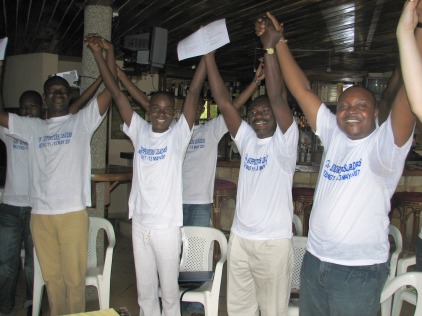http://www.pridelondon.org/blog.php?b=1214
Last year I was fortunate to have the opportunity to visit several Prides inthe US; The first ones I had ever been to. It was a revelation to me. I wasoverwhelmed by the sense of freedom among such huge crowds of people, andthe sense of security people had in their sense of identity about who theywere. Until I had seen such a situation with my own eyes and experienced thefeeling of the crowd I could not quite really believe it was some how completely true. Sometimes our imaginations are not enough to get a clearidea of the goal when we are fighting for something that deep down webelieve is a just situation – sometimes even a brief experience of is the only way to really crystallise and get clear in our minds exactly what we are fighting for.
As the leader of Changing Attitude Nigeria, the Nigerian branch of the Anglican pressure group campaigning for full inclusion of LGBT people in the Anglican Communion, I was in the US primarily to attend a conference. After Pride, back in my hotel room when I thought of the contrast with thesituation facing gay people back home in Nigeria, I cried. Would such athing ever be possible in my own country, in my lifetime?
What I had just experienced highlighted to me just how far away many countries in Africa arefrom those basic human freedoms to be who you are. Those who have followedthe international battle for gay rights may have known that in 2006 afterthe first public meeting for gay Christians in Nigeria, the atmosphere became much more openly hostile against gay people. It seems that the further forward the freedoms that LGBT people have won in the west, the further backwards Africa has become. Only South Africa is the notable exception, and there it is apparent that, whereas in many countriesoften the public attitude is ahead of the law, in South Africa the law is ahead of the public attitude – there is still a lot of public hostility to LGBT people, especially the further away from large cities you go.
In Africa there has been a wide spread tendency of leaders to manipulate often-superstitious populations by using fear of some minority group tostrengthen their own grip on power. We often think of this being political leaders, but religious leaders do just the same thing sometimes. And since when has religion been entirely divorced from politics anyway?
Most people will be aware that Nigerian Archbishop Akinola is rabble-rousing as many Anglican bishops as he can against even listening to LGBT people. Do notmistake this as being what he claims it is – a purely ‘moral’ crusade. This is a bid for power of a break-away church. But there are plenty of religiousleaders whose own distorted interpretation of the message of Christ arewilling for LGBT people to be slaughtered in the same manner as in Rwanda, if only all homosexuals could easily be identified and rounded up. The language they use is stirring up the less savoury elements of society inmany parts of Africa, and there are African political leaders who arewilling to utilise that to deflect attention from their own failings too.
As a result LGBT people are increasingly being regarded as easy prey. In the last couple of months both I and one of my closest friends and colleagues in Changing Atttitude Nigeria were viciously attacked. Even Colin Coward, the leader of Changing Atttitude in the UK, has received death threats fromreligious fanatics for his support of LGBT people in Africa.
I am privileged and fortunate to be able to attend and enjoy Pride in the UK this year. I hope you enjoy it too. And afterwards please keep an eye on the plight of LGBT people in other parts of the world, Africa included, where the freedoms we will enjoy at Pride in the UK are exchanged for the constant fear of attack else where. And I urge all my fellow Nigerians in the UK to come to Pride en masse, to share our stories, and band together, to campaign, apply pressure, and do what we can for our suffering brothers and sisters in our home countries.



 Posted by davis35
Posted by davis35 